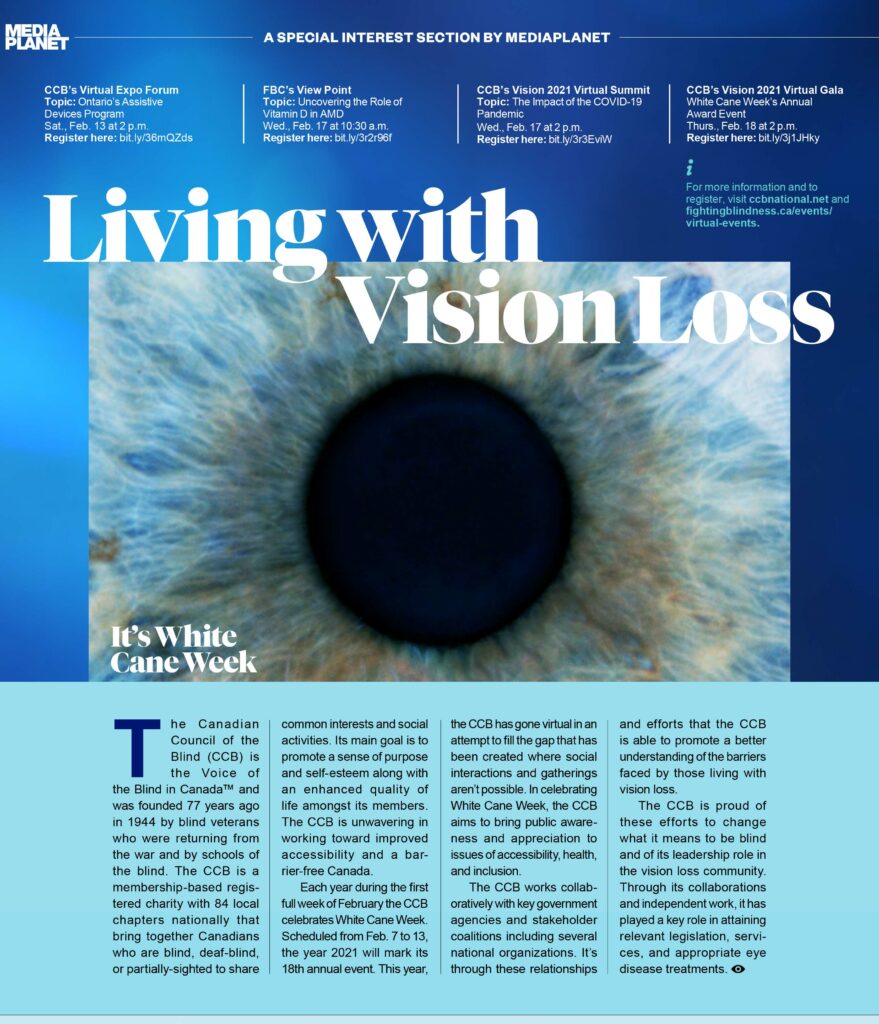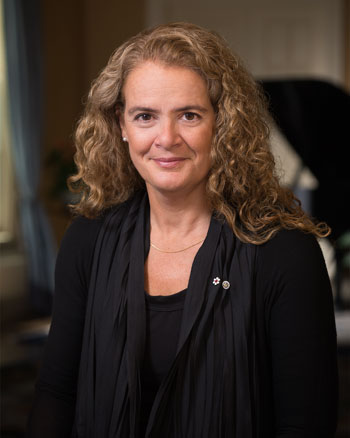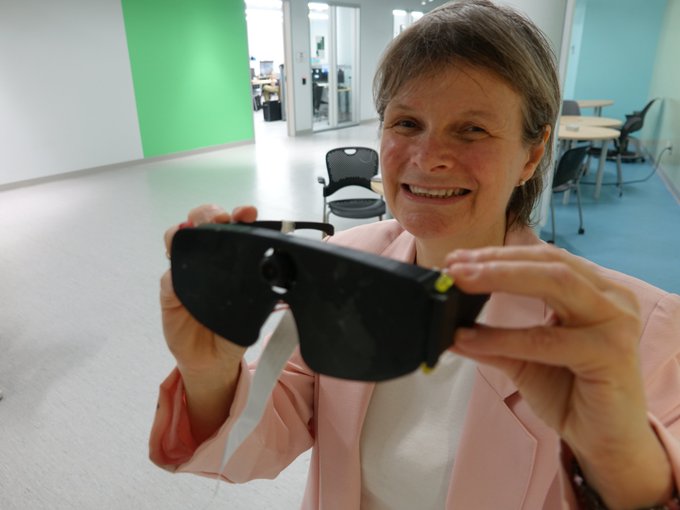Please read the full insert here.


Canadian Council of the Blind Is the Voice of the Blind in Canada™
Please read the full insert here.

On Sunday May 24th, 2020 Louise Gillis had an interview on CBC Newsnet about being vision impaired in the time of Covid-19, and the governments response. You can download the interview here.

FOR IMMEDIATE RELEASE
May 6, 2020 – Ottawa, ON – Louise Gillis, National President of the Canadian Council of the Blind (CCB), today released the findings of the CCB’s recent Survey on the Impact of the COVID-19 Pandemic on Canadians Who Are Blind, Deaf-Blind, and Partially-Sighted, which was conducted from April 7th to 14th.
The report’s objective was to provide recommendations to our federal, provincial, and municipal governments in order to assist them in creating policies to support those living with vision loss during the COVID-19 pandemic.
The survey received a robust sample of 572 responses, with respondents representing all provinces. The results paint a disturbing picture of the experience of Canada’s vision loss community during this crisis.
Speaking from her home in Nova Scotia, Gillis spoke of the need for government to recognize the circumstances presently impacting all Canadians with disabilities, but specifically the over 1,560,000 Canadians living with vision loss. “The vision loss community was too often marginalized and already socially and economically depressed prior to the arrival of the pandemic,” said Gillis, noting that, “the present situation has only served to magnify those barriers and obstacles.”
Key results of the study showed high levels of stress in the vision loss community. Respondents are very concerned about social distancing – they’re unable to see how far they are from others and are concerned that others don’t realize that they have vision loss and tend to come too close. Respondents feel unsafe when going out.
Those living with vision loss are particularly concerned that the effect of the added stress from the pandemic on their mental health may cause them to become overwhelmed.
Survey respondents are stressed about their inability to access a doctor or health care practitioner and to meet their financial obligations, and about their ability to maintain their present standard of living. They’re further stressed due to their already-fragile economic status.
Respondents also expressed concern about having transportation and finding someone to accompany them should they have to go to the doctor or hospital.
Shopping is a concern as plexiglass shields make it difficult to negotiate payment and those with seeing disabilities are uncomfortable interacting with staff. About half of the respondents indicated that they had a personal care worker entering their home, about half of whom weren’t wearing proper personal protective equipment.
Respondents are concerned that when the COVID-19 pandemic is over, they’ll discover that their job no longer exists. Many who were asked to work from home have discovered that they don’t have the proper accessible devices and technology necessary to do their jobs from home, and that their employers have refused to provide or fund them.
The survey succeeded at identifying the challenges confronting those living with vision loss during the COVID-19 crisis. As Respondent 211 commented, “What’s affecting my mental health is this prolonged and extreme isolation. As a blind person, I already live a fairly limited life when referring to freedom of movement and independence and now even that small wedge of my active life has been completely eradicated.” It’s clear that the vision loss community is being heavily impacted by the pandemic. It’s further evident that there’s a need for immediate action from all levels of government to provide support and solutions to help those living with vision loss get through these stressful times. The CCB’s resulting report includes detailed recommendations for all levels of government to consider.
“We must ensure that those with disabilities aren’t left behind and that they have the urgent support they need,” said Gillis. “Leadership must come from the top down, and therefore we’re counting on the federal government to take the lead role in providing the guidance and financial support to provinces to make sure that all Canadians with disabilities, and especially those with vision loss, have access to the needed programs and solutions.”
The Survey Report on the Impact of the COVID-19 Pandemic on Canadians Who Are Blind, Deaf-Blind, and Partially-Sighted is available on the CCB’s website and is fully accessible.
FOR MEDIA INQUIRIES, PLEASE CONTACT:
Michael Baillargeon, CCB Senior Advisor, Government Relations and Special Projects, ambaillargeon@rogers.com, 416-651-2102
ABOUT THE CCB

The CCB is the Voice of the Blind™ in Canada. Founded 75 years ago in 1944 by returning blind veterans and schools of the blind, the CCB is a membership-based registered charity that brings together Canadians who are blind, living with vision loss, or deaf-blind through chapters within their own local communities that provide the opportunity to share common interests and social activities.
The CCB works tirelessly to improve the quality of life of people with vision loss through advocacy and its dedication to building public awareness, improving the well-being of people with seeing disabilities, and promoting and providing a better understanding of, and solutions for, the barriers faced by those living with vision loss, all while promoting the fact that a lack of sight is not a lack of vision.
The CCB is proud of these efforts to change what it means to be blind, and of its success in partnering and building relationships with other national and international organizations of and for the blind. Most importantly, the CCB is proud of its leadership role through initiatives that call for access to accessible, assistive technology, the provision of the very best in available medical treatments, and the fostering of patients’ rights, all while recognizing that blindness and vision loss are avoidable.
Copyright © 2020 The Canadian Council of the Blind, All rights reserved.
Our mailing address is:
The Canadian Council of the Blind
National Office
20 James Street, Suite 100
Ottawa, Ontario K2P 0T6
Canada

February 26, 2020 – Ottawa, ON –The Canadian Council of the Blind (CCB) is honoured that Her Excellency the Right Honourable Julie Payette, Governor General of Canada, has agreed to serve, as it’s viceregal patron. We recognize this longstanding practice and are comitted to Her Excellency’s goal “to build on this tradition of recognizing exceptional contributions to Canadian society, by increasing the reach and impact of this relationship.”
“The Council is humbled by the continued recognition of its advocacy on behalf
of the 1,560,000 Canadians living with vision loss and its role in changing
what it means to be blind,” said the CCB’s National President Louise Gillis.
“Whether it’s an awareness initiative or advocating governments for improved
access and funding, the CCB identifies and addresses the specific barriers and
obstacles that confront those with vision loss living in Canada. Our original
mission and role (outlined in 1944), to promote the well-being of people with
vision loss through advocacy, education, gainful employment, social
association, and achieving a better quality of life, continues to this day.”
Today’s Canadian Council of the Blind
The CCB is the Voice of the Blind™ in Canada. Founded 75 years ago in 1944 by returning blind veterans and schools of the blind, the CCB is a membership-based registered charity that brings together Canadians who are blind, living with vision loss, or deaf-blind through chapters within their own local communities that provide the opportunity to share common interests and social activities.
The CCB works tirelessly to improve the quality of life for people with vision loss through advocacy and its dedication to building public awareness, improving the well-being of people with seeing disabilities and of its responsibility to promote and provide a better understanding of, and solutions for, the barriers faced by those living with vision loss all while shouting out, that a lack of sight, is not a lack of vision.
The CCB is proud of these efforts to change what it means to be blind, of its success in partnering and building relationships with other national and international organizations of, and for the blind. Most importantly, of its leadership role through initiatives that call for access to accessible, assistive technology, the provision of the very best in available medical treatments, and the fostering of patients’ rights, all while recognizing that blindness and vision loss are avoidable.
For media inquiries, please contact:
Becky Goodwin
National Office
Canadian Council of the Blind
Telephone: 1-613-567-0311
bgoodwin@ccb.monthlyconversion.com
www.ccbnational.net
The PSA can be seen at Masters Programme screenings at the 2019
Toronto International Film Festival
Video Description: Dr. Peter Kertes, Dr. Cyntia Qian, and Dr. Varun Chandhary talk about their favourite movie moments while a black mark grows over their images from the center of the screen. The words, Movies Stay with you. So should your vision. Followed by, Spot the symptoms of AMD. The logos appear for the Fighting Blindness Canada, Canadian Retina Society, and the Canadian Council of the Blind.

Shelley Ann Morris from the Canadian Council of the Blind had the opportunity to test out some new vision glasses designed by the students at Algonquin College for a segment on CBC morning. You can hear the segment at the link below.
CBC Ottawa Morning – Vision Glasses Segment with Shelley Ann Morris
On July 8th Shelley Ann Morris and Kim Kilpatrick from the Canadian Council of the Blind spoke with Craig Oliver about being visually impaired community radio hosts on CKCU’s Welcome to My World, a program devoted to the issues facing persons with disabilities. You can watch the Youtube video here, or click the link below to watch on AMIs site.
Shelley Ann is the voice you hear when you call the national office, and Kim is the head of the GTT Program. These are hard working ladies, both for the CCB and in the wider community.